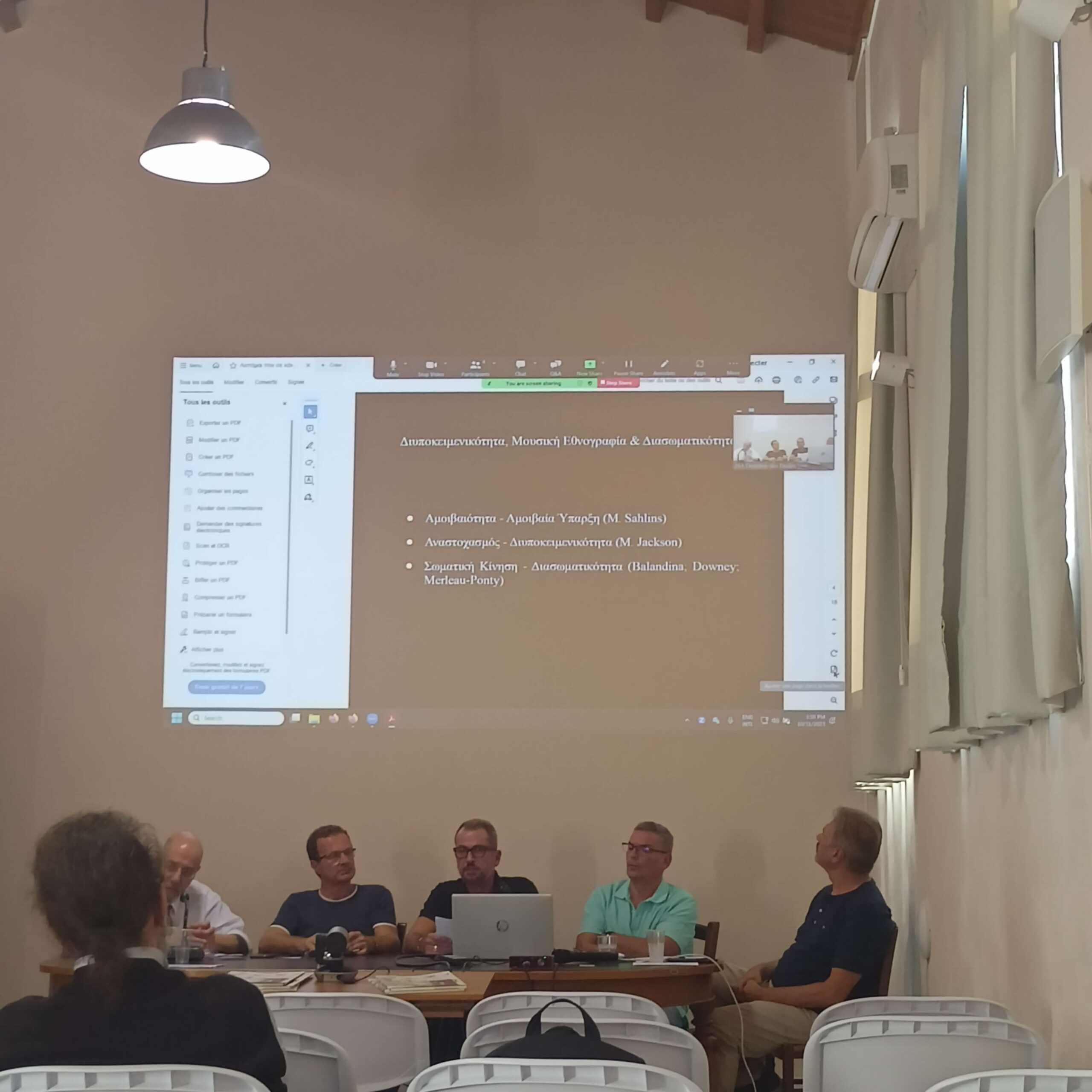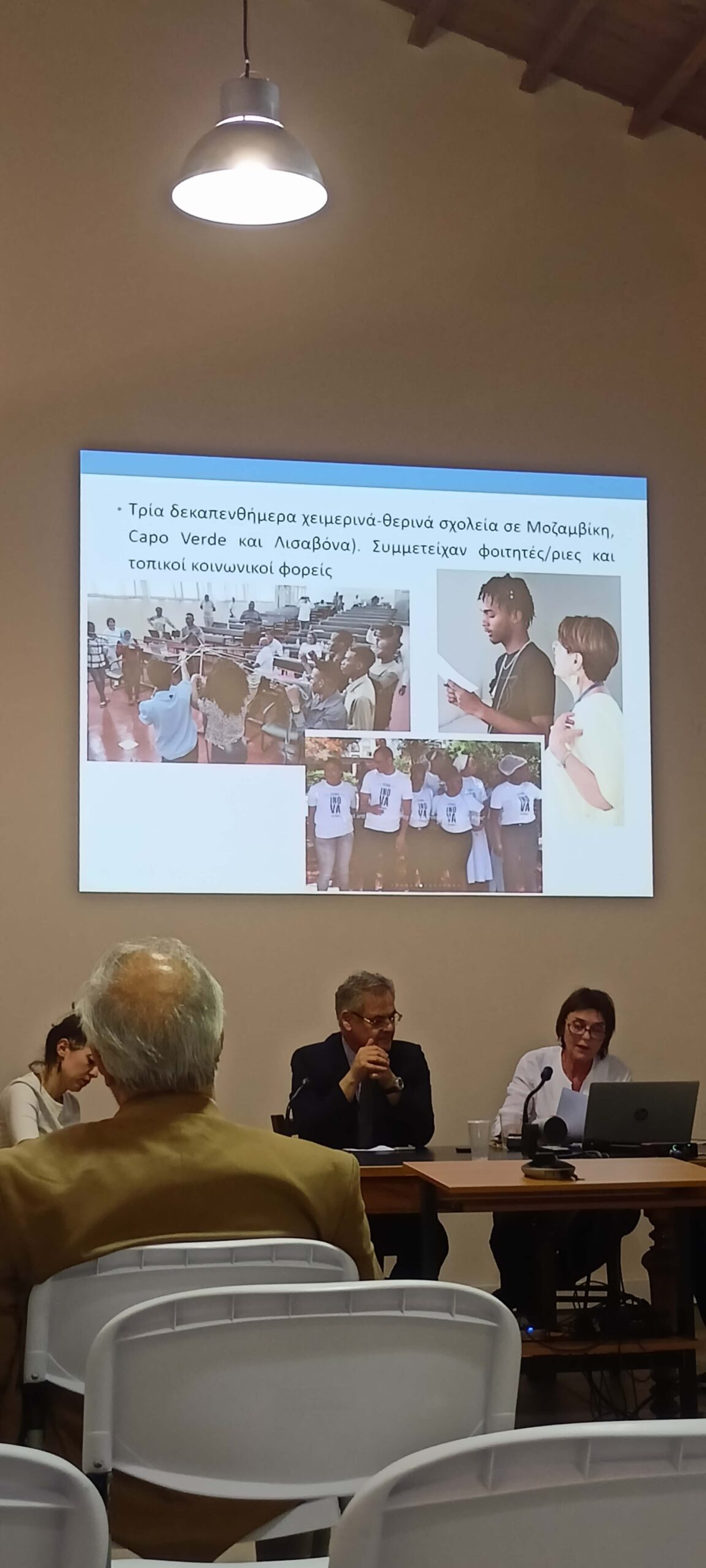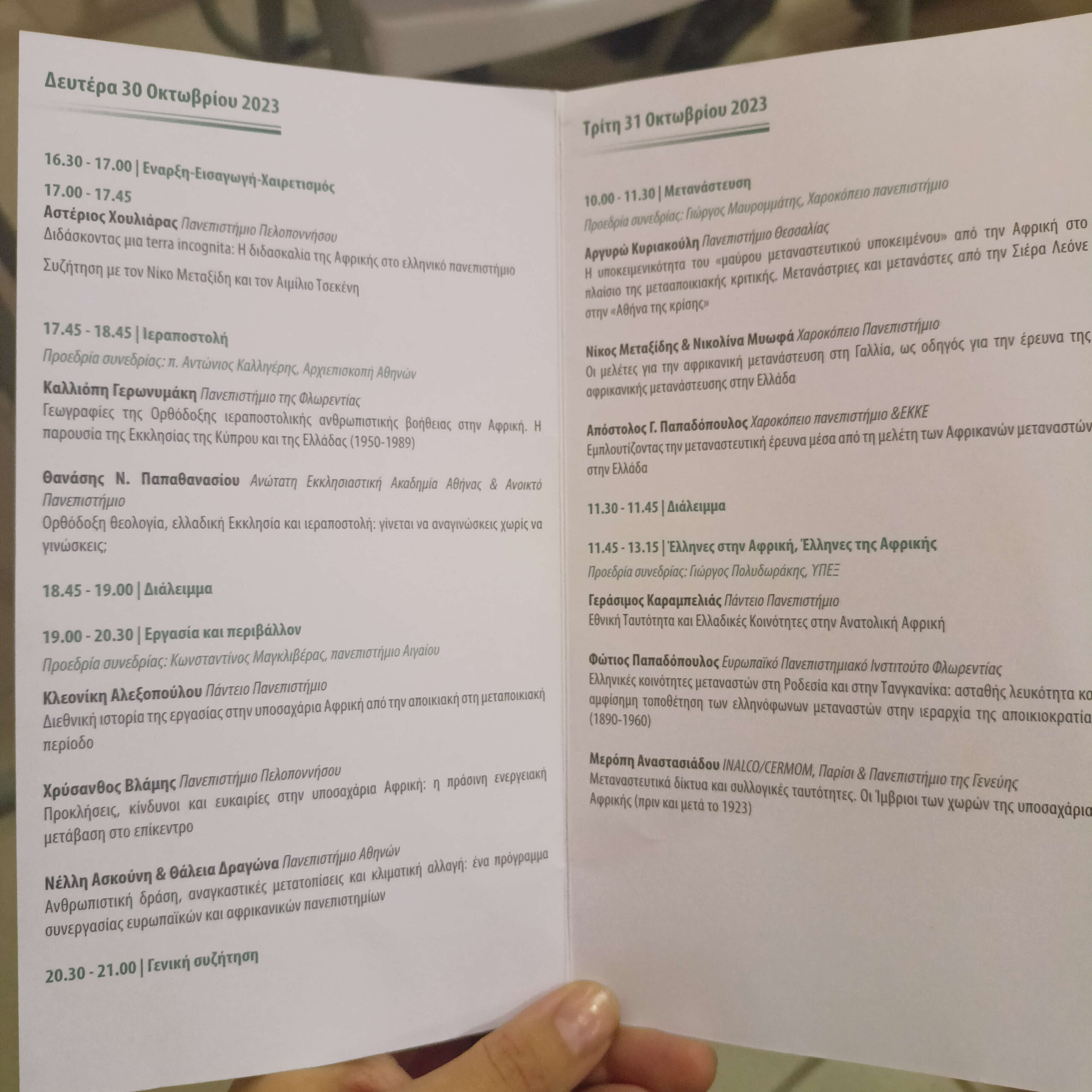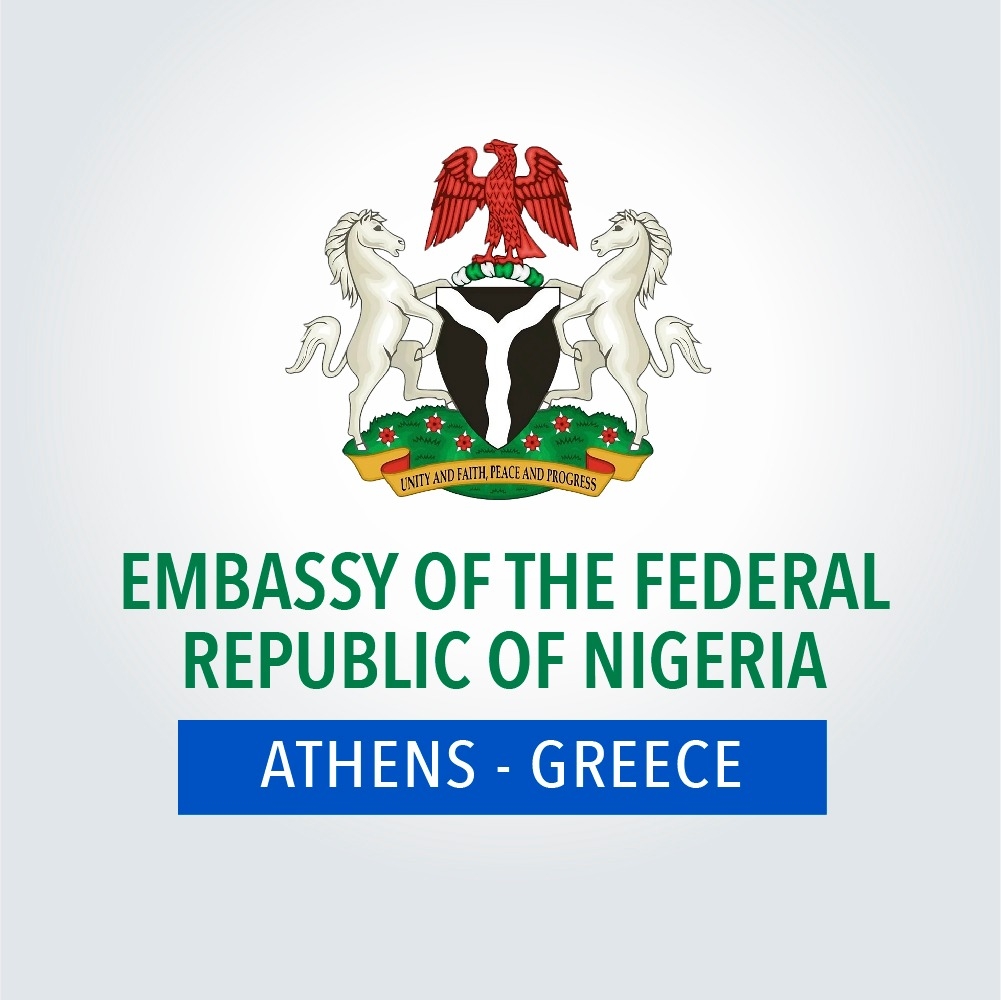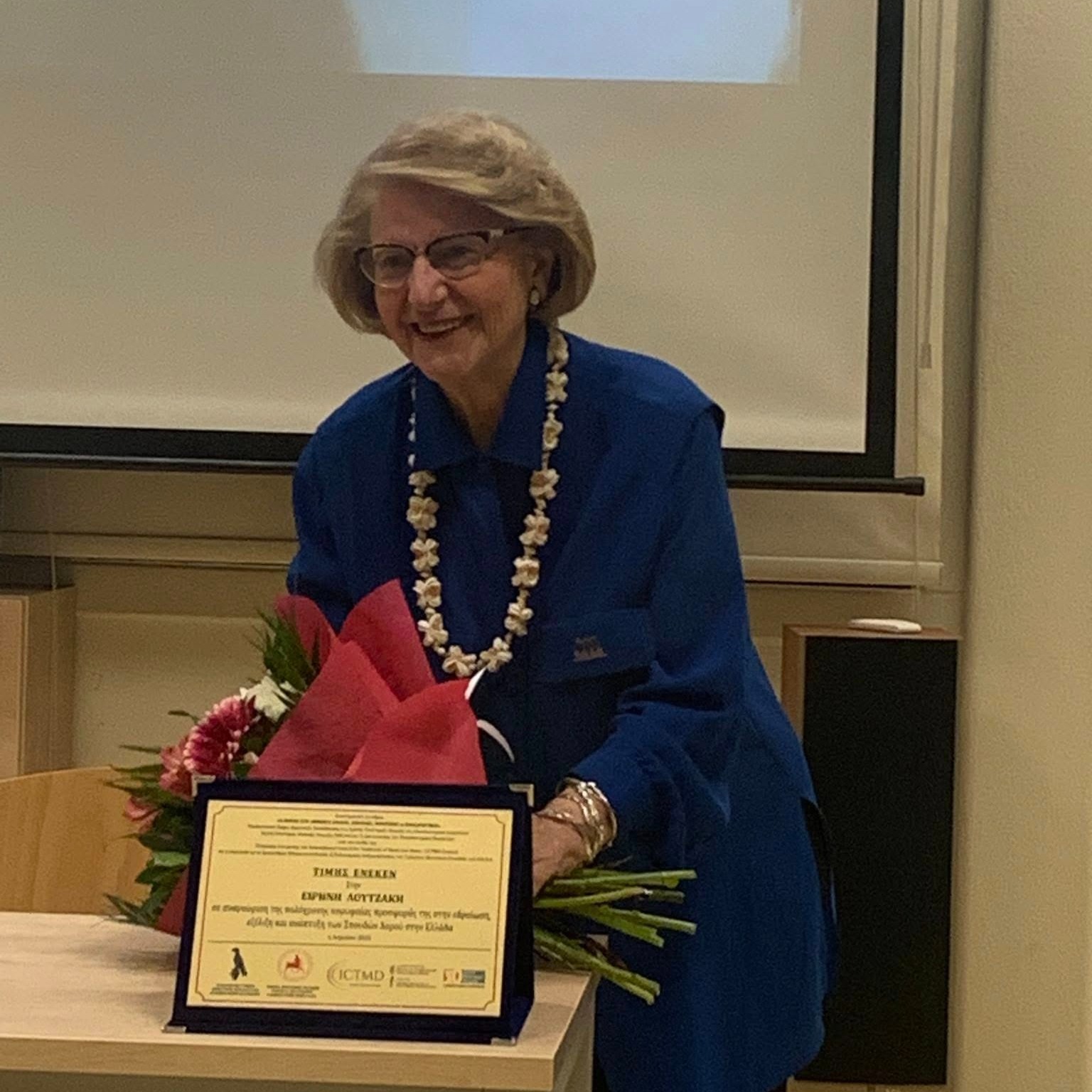Event: “Sub-Saharan Africa in Research and University Teaching in Greece Census, 2023”
The two-day conference “Sub-Saharan Africa in Research and University Teaching in Greece Census, 2023”
Host: École Française d’Athènes,
Location: Lecture hall of the French School of Athens, located at Didotou 6, Athens – hybrid format, allowing part of the audience to participate online.
Event Dates: October 30-31, 2023
The conference was organised by the following institutions:
- École Française d’Athènes,
- Centre de Recherche Moyen Orient-Méditerranée (CERMOM),
- INALCO CERMOM, Paris,
- University of the Aegean,
- Harokopion University
The scientific managers overseeing the event were:
Meropi Anastasiadou, INALCO-CERMOM (Paris)
Nikos Metaxidis, Harokopio University
Emilios Tsekenis, University of the Aegean
The Conference’s conceptual topic:
The position and presence of Sub-Saharan Africa in academic research and teaching in Greece are at the heart of the meeting organized on October 30 and 31, 2023, at the French School of Archaeology.
The major axis of the meeting
The positioning of Greek researchers in the African field is a major axis.
- Who are the researchers studying and publishing in Africa?
- What are the main thematic orientations of their research? Answers to these two questions will allow for an initial assessment of the degree of coherence in the ongoing research in the field of humanities (anthropology, history, geography, sociology, political sciences…) related to Africa.
- Where are their connections to international research on Africa? Most were trained in France or England, former colonial empires, where colonial and post-colonial studies are particularly developed.
- The question is whether and how this experience can lead to the creation of an “autonomous” field of African studies in Greece.
- How and to what extent are these specific approaches (which are part of the history of these countries) transferred to the Greek experience?
- What do Greek researchers and university teachers retain from their contacts and exchanges with their European, Asian, and African counterparts?
The second axis of the meeting
It concerns the study of the Greek Orthodox presence in Sub-Saharan Africa.
- Which aspects of this presence have been examined more?
- What is the status of the primary sources preserved on-site? This last question also raises that of the personal contact (or lack thereof) of Greek academics with the African field.
The proposal to conduct a kind of census of research in Greece regarding Sub-Saharan Africa is based, naturally, in part, on this “opening” promised by the project. An opening to different academic traditions (Europe, USA, Africa). It also contributes to the diversification of scientific research and teaching largely articulated around the national narrative. At the same time, through this initiative, a chapter of the Greek diaspora that has not been adequately studied is explored, as well as, in reflection, that of African migration to Greece.
The ancient ties between Hellenism and the African world must also be taken into account, considering the long duration: the Greek Orthodox Patriarchate of Alexandria and All Africa, to give just one example, has existed in these lands since the beginning of Christianity.
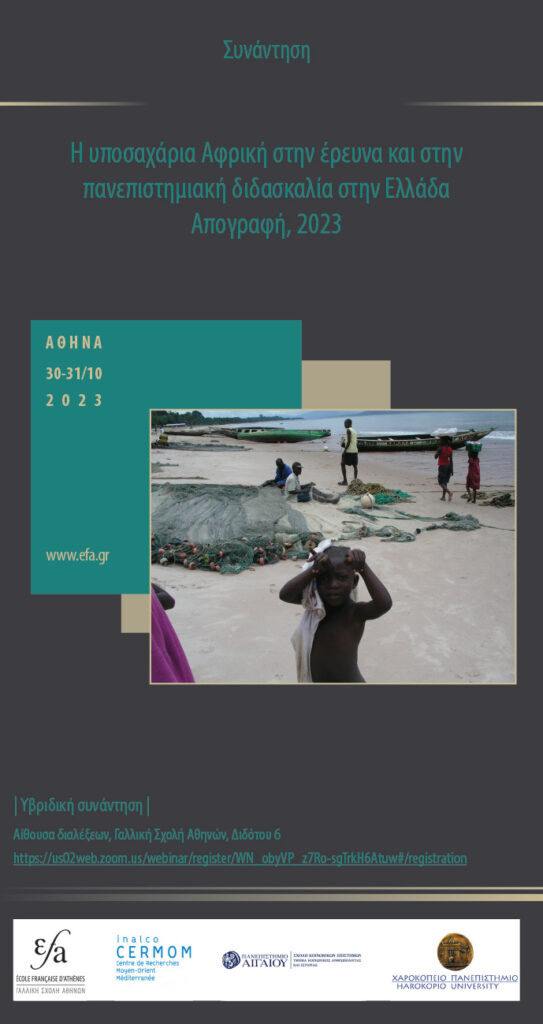
The UNESCO Chair, “Anthropology of Traditional Music: Representing and Repositioning Intangible Cultural Heritage,”
played a significant role as a key scientific coordinator in the event.
Pavlos Kavouras, the Chair Holder, took on the role of session chair for “Anthropological and Ethnographic Approaches”, marking a pivotal moment in the academic discourse. The chair’s contribution added valuable insights to the overall conference, emphasizing the importance of understanding and preserving intangible cultural heritage through anthropological and ethnographic lenses.
The session received a warm reception from both the audience and the academic community, signifying the inaugural gathering of Greek ethnomusicologists and anthropologists dedicated to the exploration of the African continent. The presentations delivered during this session covered a diverse range of topics, highlighting Greek ethnographic fieldwork in Africa, with a particular emphasis on the study of traditional music. The session fostered a rich exchange of ideas and perspectives, contributing to the growing discourse on cross-cultural research and collaboration between Greece and Africa in the realm of traditional music and anthropology.
- Yiannis Kyriakakis from the Open University explored the intersections of Greek folklore and West African spiritual practices.
- Thodoris L. Konkouris, from the University of Macedonia, delved into apprenticeship among Mande musicians-hunters in Mali.
- Emilios Tsekenis, from the University of the Aegean, presented a ‘letter approach’ to anthropological relationships.
- Gerasimos Makris from Panteion University addressed the challenges of conducting ethnographic research in Africa, particularly examining the critical question of proximity.
Pavlos Kavouras actively advocated for a transcultural approach during scholarly dialogues, offering a forward-looking perspective on the future of African Studies in Greece. This collaboration marked a historic moment for Greek ethnomusicologists, significantly enhancing the academic discourse on African studies within the Greek context. Beyond the specific session, the UNESCO Chair played a crucial role in fostering interdisciplinary dialogue throughout the event, promoting the potential for future holistic approaches to African Studies in Greece through institutional collaborations. The UNESCO Chair, “Anthropology of Traditional Music: Representing and Repositioning Intangible Cultural Heritage,” is dedicated to advancing the understanding of traditional music and its anthropological implications within the global research community. The conference served as a noteworthy step towards achieving this objective.
Congratulations are extended to the organisers, and it is emphasised that the UNESCO Chair, “Anthropology of Traditional Music: Representing and Repositioning Intangible Cultural Heritage,” stands ready to offer support for future initiatives of a similar nature. The Chair looks forward to continued collaboration and contributions in fostering understanding and engagement in the fields of traditional music and cultural heritage.
Related Articles
Activities, Events, Participations, Uncategorized


